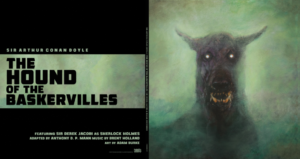Engaging with literature is a challenging task where the hapless script-writer is as much at the mercy of the fans as the rock band interpreting a classic song or the composer re-arranging a well-known classical work.
As a story, The Hound of the Baskervilles is one of the most well-known Sherlock Holmes tales and yet its place in media is a patchy one, with Conan Doyle’s superficially supernatural tale frequently abused to breaking point by unnecessary embellishments and irritating truncation. Of the versions available to date, two adaptations stand out, although neither are without their faults.
Firstly, the 1983 adaptation, featuring Ian Richardson as Holmes, brought the story to life for TV audiences. Rather more lurid than the original, it did at least capture the air of dread that hangs over Conan Doyle’s original text, although an unnecessarily dramatic finale undid some of the good work. Alas, where it really falls down is that Donald Churchill’s Watson is painted as a buffoon (a common mistake in TV portrayals of Holmes) and his fatuous manner grates throughout the piece. Secondly, the masterly ITV adaptation featuring the late, great Jeremy Brett brought the hound, once more, to the screen. Considered by many to be the definitive Holmes, Brett is a revelation and the film also boasted the quite excellent Edward Hardwicke as Watson. However, as opposed to the series that was filmed at the same time, the producers felt the need to add ‘excitement’ to the story (strange that they should loose their iron grip when the other episodes were rendered so faithfully) in no need of anything beyond Conan Doyle’s richly imaginative vision.
Here, we have an audio adaptation which promises to thrill audiences all over again. Released as a deluxe, vinyl-only album by Cadabra records, it fails on almost every level and, far from thrilling the Holmes fan, it falls victim to all of the above faults. Truncated beyond recognition, with composite characters and entirely unnecessary embellishments, Conan Doyle’s writing is neutered by a ham-fisted abridgment that entirely abuses the talents of an excellent cast. Sir Derek Jacobi (who should know better, having read an unabridged version as part of a series of adaptations) is wasted as Holmes, his perfectly-articulated tones almost entirely absent from the first half of the drama whilst Lilke Hincer makes the most of Sir Henry Baskerville despite the massacre enacted upon the text. Much of the blame must surely lie with producer Anthony D. P. Mann who, despite playing a reasonable Watson, allowed this travesty of an adaptation to pass and it’s tragic that audiences will once again be faced with one of the greatest ghost stories of the early 1900s shorn of its fangs and portrayed as the same tawdry ‘penny dreadful’ that Inspector (!) Stapleton accuses Watson of producing.
The run time, a mere thirty-four minutes, should have rung alarm bells, I suppose, but even the brevity of the performance can’t hide the fact that the majority of the cast are forced to overact dreadfully in order to paper-over the immense shortcomings of the script and Mann’s Watson is particularly guilty of cramming in huge swathes of exposition that were entirely absent from the original. Even Jacobi, as Holmes, fails to bring the aloofness to the character that Brett so excelled at, emerging instead as somewhat smug when he finally discloses the key moment that aroused his attention. Moments that should have the listener upon the edge of their seat are similarly dispatched with disdain as Watson narrates efficiently but without tension and sound effects are seemingly utilized from an old horror movie FX CD. Disappointment barely covers it.
Whilst technically this is reasonably-produced, albeit at a considerable budget compared to the classic Clive Merrison radio plays, it offers little to the long-time Sherlock Holmes fan. Whilst I had high hopes for this release, the reality is that it is a poor imitation of a story that, in its original format, guarantees to frighten whole new generations if only allowed to enjoy it unabridged. If, as Conan Doyle would put it, you value your life or your reason, avoid this recording at all costs. Neither scary, nor interesting, it is a wholesale pillaging of a truly great mystery of the imagination. 1




